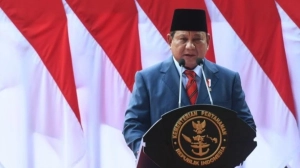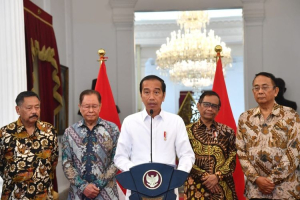Government regulation in lieu of job creation law faces criticism
President Joko "Jokowi" Widodo signed the government regulation in lieu of law (Perppu) on job creation on December 30, 2022, due to "several urgent reasons", including to anticipate the global economic condition.
The Law No. 2/2022 on Job Creation was declared "conditionally unconstitutional" by the Constitutional Court (MK) in late 2021. The court ordered policymakers to restart the process within two years, or it would be deemed unconstitutional.
Urgency and legal certainty
"First, the government has the urgency to accelerate the anticipation of global economic condition as we may face global recession, increasing inflation and stagflation threats. There are 30 developing countries which have requested aid from the International Monetary Fund (IMF)," Coordinating Minister for the Economy Airlangga Hartarto told the press at the Presidential Palace.
He also explained that the geopolitical condition, due to the Russia-Ukraine war, and other unresolved conflicts as other considerations for the government. The impact of those conflicts has made several countries facing food, energy and financial crises.
Airlangga further explained that the Court's ruling on the job creation law also influenced the behaviors of businesses at home and overseas. Moreover, the government has set a higher target of investment value in 2023.
"Therefore, it is important to have a legal certainty. The issuance of the Perppu hopefully can fulfill the much needed legal certainty," he said.
Meanwhile, Coordinating Minister for Politic, Law and Security Mahfud MD said the issuance of the Perppu was a strategic measures by the government to face global threats in the future. He added that without strategic measures, the government would not be able to anticipate the global economic situation.
"To take this strategic measures, we cannot wait until the deadline set by the Constitutional Court Ruling No. 91/PUU-XVIII/2020. The government will be too late to anticipate and save the situation," he said.
Rejections on minimum wage
The Confederation of Indonesian Trade Unions (KSPI) President Said Iqbal said that after studying and reviewing the Perppu and compared it with the Job Creation Law No. 13/2013, the confederation rejected the Perppu.
According to Iqbal, the KSPI objected the Perppu, mainly on minimum wage issues.
In the Perppu, the minimum wage for regencies and mayoralties "can be decided "by governors. This article is the same with the Job Creation law. The legal term for "can" means that the governor can or cannot decided it, depending on his will. The workers proposed the redaction of the article as "governor decides minimum wage for regencies/mayoralties".
Another issue in the job creation law stipulates that the minimum wage is calculated based on inflation or economic growth. The term "or" means that there is choice here. While in Law No. 13/2003, the minimum salary of workers was based on survey on the decent basic needs. The derivative of the law is Government Regulation (PP) No. 78/2015 that uses inflation and economic growth for the calculation. The term "and" means the accumulation of both inflation and economic growth. While in the Perppu, the minimum wage is established based on variables of inflation, economic growth and certain index. The workers rejected this article because in the manpower law, the term certain index is unknown in establishing a minimum wage.
"We suspected that certain index in the Manpower Ministry Regulation No. 18/2022 uses index from 0.1 to 0.3. The federation wants there is no need for certain index," said Iqbal.
"Another rejected article in the Perppu is article 88F that mentioned 'in certain situation the government establishes minimum wage's calculation formula that is different from the formula that is regulated in article 88D verse 2'. The workers deemed this article give a blank check for the government. So, it is easier for the government to change the regulation," he said.
In addition, the workers also rejected articles on outsourcing, lay offs and foreign workers employment. "The recruitment for foreign workers needs permit from the government," he explained.
Perppu unlikely to attract investments
Economist at the Center of Economic and Law Studies (Celios) Bhima Yudhistira said there were 5 factors that may not able to increase investments.
First, the presence of the Perppu amidst the Constitutional Court ruling that the job creation law "conditionally unconstitutional" would become a polemic and create a policy uncertainty.
"If we see from the global competitiveness index, one of the main issues was policy certainty. I am worried that in the political year [in 2023], the government regulation that have unclear basis will create uncertainty," Yudhistira explained.
Second, there must be urgency. There is no compatibility between the government's indicator and the urgency indicator in the issued Perppu. For example, in the State Budget, the target for 2023 economic growth is 5.3% and inflation can be maintained.
"The government said Indonesia was in emergency situation but it has not issued economic policy package to anticipate economic recession. It means the government still considers the current situation in the safe limit based on several targets and macro economic assumptions. Even more, Indonesia will grow positively," Yudhistira said.
Third, the Perppu does not answer investment issues. It focuses more on workers and permits. The logistic problem has been left unanswered. "The issue of wage certainty has been suited by both workers and businessmen. It means that the law cannot be a bridge for both parties," he added.
Fourth, the Perppu is not effective as in the perspective of political economy, it has a tendency to authoritarianism. Countries, which respect freedom of expression and democracy, have voiced their concerns on Indonesia's authoritarianism turn after the enactment of the new Criminal Code law and the Perppu.
"Investors from advanced nations, who are experiencing recessions, will be in doubt because Indonesia takes a shortcut without considering democratic and good lawmaking regulations. At the same time, investors has their own ESG [environmental, social and governance] in evaluating investment worthiness of a country," Yudhistira pointed out.
Fifth, he believes the Perppu will be annulled by the Constitutional Court. The government and the House of Representatives (DPR) should revise the Job Creation Law instead of issuing the Perppu. The revision should include fundamentals issue like human resources, logistical costs, regional connectivity and corruption.
"The main issue in the competitiveness is corruption eradication. If we wanted more investments, the government should eradicate illegal fees and corruption," Yudhistira said.
Already have an account? Sign In
-
Start reading
Freemium
-
Monthly Subscription
20% OFF$29.75
$37.19/MonthCancel anytime
This offer is open to all new subscribers!
Subscribe now -
Yearly Subscription
33% OFF$228.13
$340.5/YearCancel anytime
This offer is open to all new subscribers!
Subscribe now







